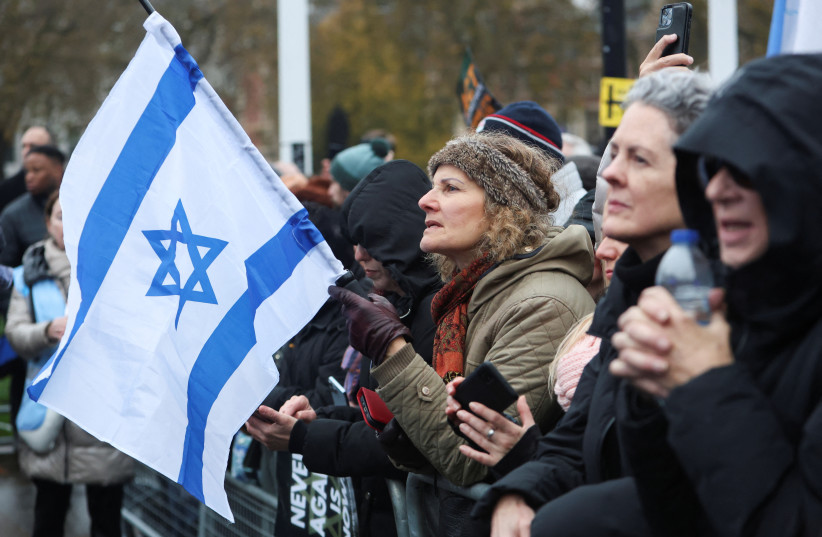The Hamas terror attack of October 7 has created a new reality for Jews and Jewish communities around the world, which now face an unprecedented surge in antisemitic acts of violence, harassment, and intimidation. While the Jewish people have historically shown exemplary resilience, this new reality is forcing many Jews to reevaluate life in their home countries.
Protecting Jewish communities – and indeed entire societies – from hate-fueled forces was top of the agenda at last week’s Zagreb plenary of the International Holocaust Remembrance Alliance (IHRA), an international organization of 300 delegates from 35 member countries dedicated to safeguarding the memory of the Holocaust and combating antisemitism. I was attending the gathering as a member of the Greek delegation, and have urged delegates to redouble and upscale our efforts in these times of crisis.
I can draw five conclusions from the Israel-Hamas war that are relevant to the current impact on Jewish life in the Diaspora.
- There has been an unprecedented surge in antisemitism among certain groups. IHRA delegates are aware of this explosion, unmatched in recent memory. In some countries, statistics show unprecedented rates of antisemitism, among them a 540% uptick in the United Kingdom, an 800% jump in the Netherlands, and a 1,000% increase in Brazil, compared to the same period last year. Such opinions are prevalent in certain pockets of the population, such as on the extreme Left or Right, or in certain Muslim communities.
- The current crisis has contaminated all levels of society and revealed a deep-rooted and often explosive antisemitism among large segments. Social media now accelerates these pernicious beliefs at lightning speed and new iterations of this hatred, mixed with old and new conspiracy myths, flow into mainstream society with great ease. On college campuses and at mass rallies worldwide, we see not only manifestations of antisemitism but the widespread glorification of terrorism. This reveals the shortcomings of educational efforts of past years to curtail such sentiments. These are symptoms of a wider failure in society. As the late Rabbi Lord Jonathan Sacks reminded us, “We make a terrible mistake if we think antisemitism is only about Jews. It just isn’t. A country that has a culture that has no room for Jews has no room for difference. It therefore has no room for humanity.”
- Israeli government policies are being linked, increasingly, to Jewish communities in the Diaspora. October 7 was a watershed that irreversibly changed Jewish life in the Diaspora. Much of the current Jew-hatred is disguised as criticism of the policies and actions of the State of Israel. This phenomenon, while certainly not new, has become more visible. Israel’s actions can certainly be critiqued, but they should not be used as a cudgel against Israelis and Jews everywhere. IHRA has successfully codified some of these manifestations in its non-legally binding definition of antisemitism, which includes 11 illustrative examples, such as comparing Israelis to Nazis or accusing Jewish citizens in the Diaspora of being more loyal to Israel than to other nations. The IHRA definition is becoming more important and useful to governments around the world, enabling prosecutors, police officers, and educators to distinguish acts of antisemitism from legitimate criticism of the government of Israel.
- Holocaust commemoration will be affected. The October 7 terror attack, which saw more Jews killed in any single day since the Holocaust, also evokes the tragic events of World War II. Some compare Hamas to the Nazis, some of the victims describing their experience in terms of a pogrom or the Nazi genocide. Other comparisons are problematic in that they relativize and trivialize the Holocaust. Whatever the motivation behind using Holocaust-related phraseology, Holocaust remembrance will be affected for decades to come. The brutality and scale of Hamas’ terror and the vitriolic antisemitism it unleashed will impact all future Holocaust commemoration ceremonies.
- Governments have forcefully stood up to these challenges. We’ve seen some hopeful responses to recent events. Unlike in the past, many nations have stood up for their Jewish communities at this time of their heightened peril and have clearly denounced antisemitism. Many leaders have realized over time that prioritizing the fostering of Jewish life and the fight against antisemitism only contributes to stronger and more resilient democratic institutions.

We can't go back to October 6
There is no way to go back to October 6. Democracies around the globe must cooperate and IHRA provides a framework. Together, we can learn from each other’s successes and failures. Innovative training, best practices, and new tools are indispensable. Policies will be revised, laws will be enacted, and tactics will be readjusted. The determination to combat antisemitism should continue unabated. International organizations, governments, civil society groups, and academia must look inward to understand what went wrong.
Otherwise, the hateful ideologies unleashed on that dark day in October will poison all of civilized society.
The writer is the World Jewish Congress representative to the UN in Geneva and UNESCO, and WJC coordinator on countering antisemitism, as well as a member of the Greek delegation to the International Holocaust Remembrance Alliance (IHRA).
